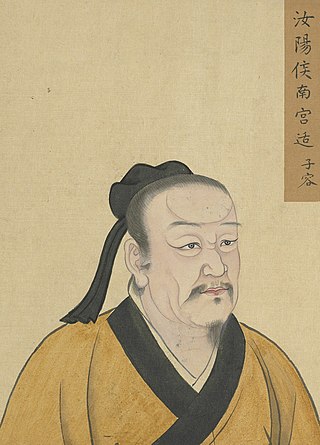Related Research Articles
Chinese surnames are used by Han Chinese and Sinicized ethnic groups in Greater China,Korea,Vietnam and among overseas Chinese communities around the world such as Singapore and Malaysia. Written Chinese names begin with surnames,unlike the Western tradition in which surnames are written last. Around 2,000 Han Chinese surnames are currently in use,but the great proportion of Han Chinese people use only a relatively small number of these surnames;19 surnames are used by around half of the Han Chinese people,while 100 surnames are used by around 87% of the population. A report in 2019 gives the most common Chinese surnames as Wang and Li,each shared by over 100 million people in China. The remaining eight of the top ten most common Chinese surnames are Zhang,Liu,Chen,Yang,Huang,Zhao,Wu and Zhou.

Chinese names are personal names used by individuals from Greater China and other parts of the Sinophone world. Sometimes the same set of Chinese characters could be chosen as a Chinese name,a Hong Kong name,a Japanese name,a Korean name,a Malaysian Chinese name,or a Vietnamese name,but they would be spelled differently due to their varying historical pronunciation of Chinese characters.

Zheng is a Chinese surname. It is the 7th name on the Hundred Family Surnames poem. In 2006,Zheng ranked 21st in China's list of top 100 most common surnames. Zheng belongs to the second major group of ten surnames which makes up more than 10% of the Chinese population. Zheng was a major surname of the rich and powerful during China's Tang dynasty.
Luo or Lo refers to the Mandarin romanizations of the Chinese surnames 羅 and 駱. Of the two surnames,wikt:罗 is much more common among Chinese people. According to the Cantonese pronunciation,it can also refer to 盧.

Chang is the pinyin romanization of the Chinese surname 常 (Cháng). It was listed 80th among the Song-era Hundred Family Surnames.

"Guo",written in Chinese:郭,is one of the most common Chinese surnames and means "the wall that surrounds a city" in Chinese. It can also be transliterated as Cok,Gou,Quo,Quach,Quek,Que,Keh,Kuo,Kwo,Kuoch,Kok,Koc,Kwee,Kwek,Kwik,Kwok,Kuok,Kuek,Gock,Koay,or Ker. The Korean equivalent is spelled Kwak;the Vietnamese equivalent is Quách. The different ways of spelling this surname indicate the origin of the family. For example,the Cantonese "Kwok" originated in Hong Kong and the surrounding area. In the Philippines,it's "Que","Ke","Quepe",and "Kepa". It is the 18th most common family name in China and can be traced as far back as the Xia dynasty. There are eight legendary origins of the Guo surname,which include a Persian (Hui) origin,a Korean origin,and a Mongolian origin,as a result of sinicization. However,the majority of people bearing the surname Guo are descended from the Han Chinese.
Liang is an East Asian surname of Chinese origin. The surname is often transliterated as Leung or Leong according to its Cantonese and Hakka pronunciation,Neo / Lio / Niu,or Liong (Fuzhou). In Indonesia,it is known as Liong or Nio. It is also common in Korea,where it is written Yang (양) or Ryang (량). In Vietnam,it is pronounced as Lương.
Qiú is the Hanyu Pinyin transliteration of 仇(Qiú) and 裘(Qiú).

Nangong is a county-level city in the south of Hebei province,China. It is administered by the prefecture-level city of Xingtai.
Yu is the pinyin romanisation of several Chinese family names. However,in the Wade–Giles romanisation system,Yu is equivalent to You in pinyin. "Yu" may represent many different Chinese characters,including 余,于,由,魚 (鱼),漁(渔),楀,俞(兪),喻,於,遇,虞,郁,尉,禹,游,尤,庾,娛(娱),and 茹(Rú).
Nangong Kuo was a top official of King Wen of Zhou during the late Shang and early Western Zhou dynasties. In the "Jun Shi" (君奭) chapter of the Classic of History,the Duke of Zhou names him as one of the five key advisers of King Wen,together with Guo Shu,Hong Yao,Tai Dian,and San Yisheng. After King Wen's death,Nangong Kuo became a key adviser of his son King Wu.

Lü is the pinyin and Wade–Giles romanisation of a Chinese surname,most commonly 吕 and 呂.
Nan (南),Nangong (南宮),Nanguo (南郭) is a Chinese surname.
Dǒng is a surname of Chinese origin. DONG is from a Chinese character that also means "to supervise" or "to manage." The story goes that in the 23rd century BC,an adviser to the Emperor Shun was conferred this surname due to his ability to supervise and train dragons. In 2019,it was the 35th most common surname in Mainland China,shared by 6,770,000 people or 0.510% of the population.
Kong is a Chinese and Korean surname. It can also be written as Kong in Taiwan,Hung in Hong Kong,Khổng in Vietnam,and Gong in Korea. There are around 2.1 million people with this surname in China in 2002,representing 0.23% of the population. In 2018,it was the 97th-most common surname in China. It is the 25th name in the Hundred Family Surnames poem.
Namgung is a Korean surname. It derives from the Chinese character 南宮.

Shěn is the Mandarin Hanyu pinyin romanization of the Chinese surname 沈.
Chao is a surname in various cultures. It is the Pinyin spelling of two Chinese surnames,the Wade–Giles spelling of two others,and a regional or other spelling of two additional Chinese surnames. It is also a Galician and Portuguese surname.

Nangong Kuo,commonly known as Nan Rong and also known by his courtesy name Zirong and as Nangong Tao,was a major disciple of Confucius. Commending Nangong Kuo as a gentleman of virtue,Confucius gave the student his niece in marriage.
Hamyeol Namgung clan is one of the Korean clans. Their Bon-gwan is in Iksan,North Jeolla Province. According to the research held in 2015,the number of Hamyeol Namgung clan was 20715. Namgung su who was the Imperial family in Zhou dynasty,China started Korean Namgung clan. When Gija conquered Korea,Namgung su founded Gija Joseon with Gija and worked as Situ (office). Namgung su taught Koreans etiquette,agriculture,rice farming,sericulture and weaving. The founder of Hamyeol Namgung clan was Namgung Won cheong who was a descendant of Namgung su. Namgung Won cheong worked as Four-star rank and Pingzhangshi in Goryeo.
References
- ↑ Hongmungwan. 增補文獻備考卷 (Chŭngbo munhŏn pigo kwŏn) (in Korean). 10–15. Retrieved 27 February 2018.
{{cite journal}}: Cite journal requires|journal=(help) - 1 2 【南宮】姓の由来と語源 (Origin of the surname "Nanguu"). name-power.net (in Japanese). 2017. Retrieved 26 February 2018.
- ↑ Wu, Jie; Yang, Jianchun (2014). 张、王、李、赵谁最多——2010年人口普查姓氏结构和分布特点 (Zhang, Wang, Li, Zhao: Which one is the most popular -–2010 Census' characteristics on surname structure and distribution). 中国统计 [Chinese Statistics] (in Simplified Chinese) (6). Retrieved 27 February 2018.
- ↑ 香港報紙 「信箱」大放異采 [The "mailboxes" of Hong Kong newspapers shine in their own ways]. am730 (in Simplified Chinese). 1 February 2018. Retrieved 27 February 2018.
- ↑ Zhang, Renyuan (2003). 中华姓氏故事 [Stories of Chinese Surnames]. Daxiang Publishers. ISBN 9787534731150 . Retrieved 26 February 2018.
- ↑ Cai, Zaomin (2014). 南宮搏著作研究 [A research into Naamgung Bok's literary works] (in Simplified Chinese). Wanjuanlou Books Co. Ltd. ISBN 978-957-739-858-1 . Retrieved 27 February 2018.